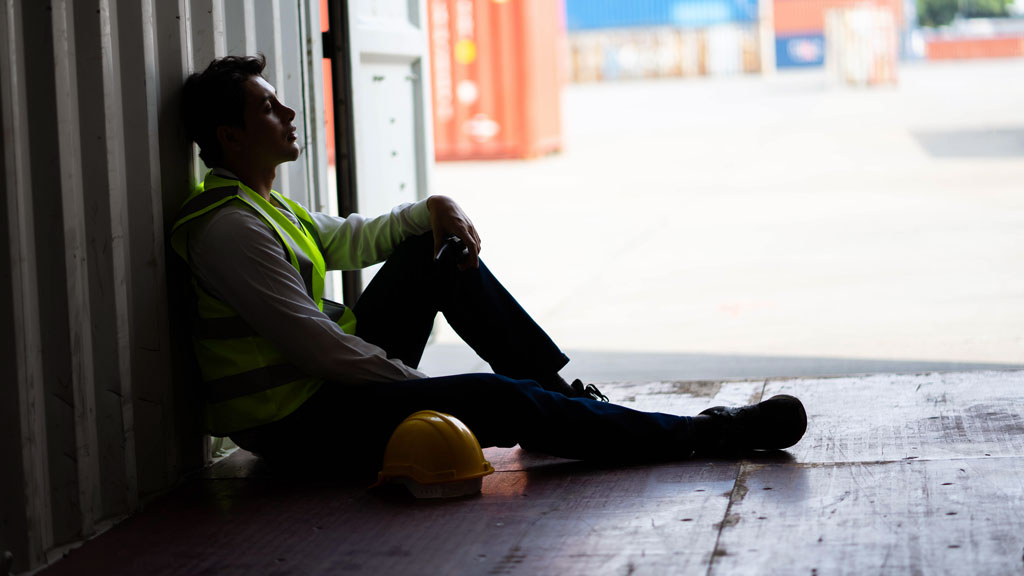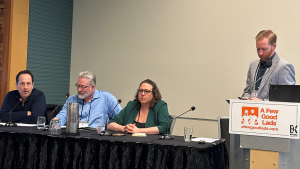It’s a demanding industry but help is out there.
Greg Hemminger and Rory Kulmala with the Tailgate Toolkit sat down with a small group at BUILDEX Vancouver to discuss their ongoing efforts to address substance use in the construction industry.
“We have a big social problem, but right now we’re trying to get out there and save a life,” Kulmala, who is also CEO of the Victoria Island �鶹��ý����ion Association (VICA), said at the conference.
“Sometimes, us in this room don’t appreciate the darkness these people are in.”
One of the most recent additions to the toolkit is , a free, anonymous weekly support meeting for people struggling with substance use. The program is provided in partnership with the Umbrella Society for Addictions and Mental Health.
“We’ve had 51 support group meetings with Hammer Time so far,” Hemminger said.
Hammer Time offers a vital space for people to connect with others over their struggles with no strings attached.
It took six months, even when I had the moment of clarity, actually putting it into action took six months,
— Greg Hemminger
Tailgate Toolkit
“The life of a construction worker isn’t for everyone, and most people don’t get it. That’s why we have created a space to talk about substance use with others in our industry,” reads Tailgate’s website.
“Hammer Time is a fully anonymous, social support group (there’s no religious component, it’s not a 12 step program, and you don’t have to be sober to participate) being delivered in a partnership between the Tailgate Toolkit and the .”
A program like Hammer Time enables connections for people struggling, perhaps the most vital lifeline.
“It is said that every person in addiction has nine minutes a day where if you got to them and got them the support they needed, they would get help,” Hemminger said.
“They will be ready, willing and able. The trick is getting to them in that nine minutes. Strike while the iron is hot.”
Hemminger emphasized the importance of time in battling demons like addiction.
“The trick sometimes is staying alive until you have that moment of clarity,” he said.
“It took six months, even when I had the moment of clarity, actually putting it into action took six months.”
Having a support group of any size and people to speak with is essential, he said.
Hemminger provided an example of the first time he joined a support group after being six months sober. Another member of the group asked for his number and started texting him every morning just asking how he was doing.
“They weren’t texting for any reason but to establish contact each and every day to let me know that if something does go sideways during my day that they could be there.”
Having contact established strengthens the support web and enables people struggling to reach out for help.
“Now it’s easier to make that second call and say, ‘I know you asked me and, ultimately, I was doing well this morning. But as of 11 a.m. my day just went to sh** and I’m in a really dark place right now.’
“That support community is embedded. Wouldn’t it be wonderful if we could have that type of community on a construction site?”
Kulmala says there is a tendency for people in the industry to voice concern but lack action.
“You know, there’s a lot of people saying, ‘Yep, we do want to step up, we want to do something.’ And yet, the people that care don’t find time in their calendar to learn a little bit, to figure something out.”
Kulmala put out a call to action for the sector.
“If you have a way to influence your organization, your colleagues (do it). The change for our sector starts here.”
He emphasized simply hosting information sessions is often not enough.
“You can’t just say, ‘We’re going to have a talk. We just want all the people who are addicted to drugs to come to this talk.’ I’ve already tried, it doesn’t work.”
He told a story from when he started with VICA and pushed for addressing the substance crisis.
“I actually had some people from our community say, ‘Don’t say anything. Why? Well, people are gooing think we have a problem.’
“But it’s all here. We know it’s there. We’ve seen people die in record numbers.”
Kulmala expressed frustration the same fervour does not arise from addiction deaths as it does from workplace fatalities.
“We have people that are going home at the end of the day that are not coming back. We’re always saying, ‘We want you to go home safe at the end of the day.’
“It’s just as critical to say, ‘I want you to come back.’”
Kulmala encouraged people to reach out to the Tailgate Toolkit to come to their site and work with people. Every program offered is free.
And every worker lost to addiction is a loss for the industry.
“We have such a labour shortage ― and I’m not saying when there’s lots of labour we don’t care ― but it’s never been so critical to find places in our workforce that can keep people safe.”
If you are interested in working with the Tailgate Toolkit to battle addiction on your site, in your company or in the industry at large, .











Recent Comments
comments for this post are closed